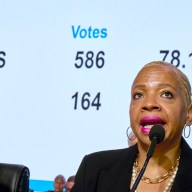 Author and admissions counselor Joie Jager-Hyman tells students not to stress if they’re not making straight A’s.
Author and admissions counselor Joie Jager-Hyman tells students not to stress if they’re not making straight A’s.
A new school year is rapidly approaching with a fresh batch of seniors getting ready to apply to college. Whether your dream school is Stanford or your local state university, the application process can be stressful between standardized tests, essays, fees and cutthroat competition. We called up college counselor and author of the book “B+ Grades, A+ College Application,” Joie Jager-Hyman to find out how you can make your application stand out in the crowd.
In your book you list six different types of applicants. Could you tell me a little about each and how you’ve developed that breakdown?
I developed that breakdown based on the type of students that I’ve worked with. [The types of students] come from the different attitudes that I’ve seen among applicants. I’ve been doing college counseling for 12 years, and I’ve really noticed that there are good students who wanted to go to college, but really felt ignored by their guidance counselors and even advice books.
How do you get students to look beyond the name of a particular school?
It can be hard, and as someone who has worked in the admissions office, I really try to explain the admissions process in a way that doesn’t make the student feel like the admissions offices are really judging their ability or merit. The process really isn’t set up for that, and it’s not even predictive of who will be successful in college. So, I really try to get the students to see that if they don’t have a shot at a top-tier school, it’s not because of them as a person, but it’s because of the system and the system is not designed to sort them in a way that reflects their actual potential. Once they understand that, no, they may not get into NYU, but it doesn’t mean that they’re a loser, it definitely helps.
What’s the biggest mistake people make in their essays?
The biggest mistake that I see is people who sit down to write their essays and it’s as if it’s to this imaginary old man with patches on his sleeve who’s grumpy and they’re trying to impress him. However, that’s the quickest way to not be yourself. A good essay needs a little bit of conflict, and you have to be interesting. The worst thing you could do is sensor yourself and be inauthentic.
What’s the difference between “early decision” and “early action”?
They’re very similar in that the student applies early in the school year to the college. The one key difference is that early decision is binding, while early action is not. If a student applies early decision then they must enroll in the school. If they apply early action then they have an option to not accept the admission offer.
What’s your biggest piece of advice?
Remember that there are options. There are thousands of colleges and every student has so many schools that they could get a good education from. Approach the process from a perspective that you have so many choices and they don’t lie within one school.
















